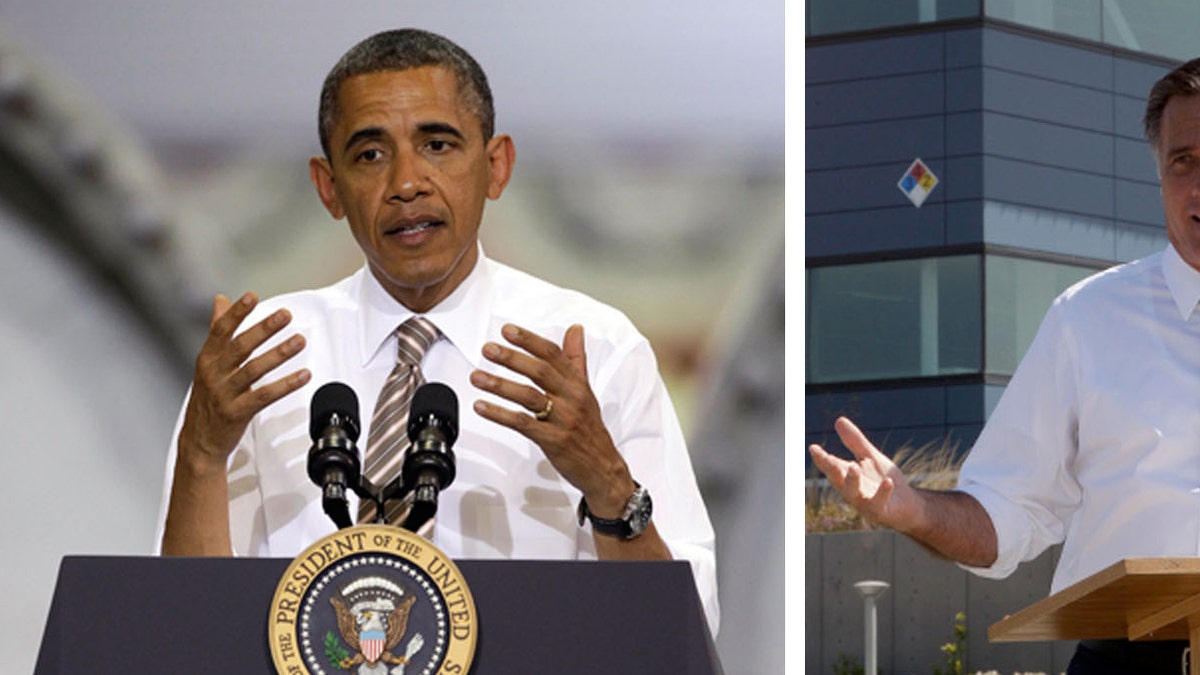
This combination of Associated Press file photos shows from left, President Obama speaking at the TPI Composites Factory, a manufacturer of wind turbine blades on May 24, 2012, in Newton, Iowa, and Republican presidential candidate, former Massachusetts Gov. Mitt Romney speaking at the Solyndra manufacturing facility on May 31, 2012, in Fremont, Calif. The weak May unemployment report released Friday, June 1, 2012, presents President Barack Obama with a sobering reminder that his stewardship of a gradual recovery from the deepest recession since the Great Depression presents a tenuous argument for his re-election. However anemic job growth and an uptick in joblessness to 8.2 percent give new resonance to Republican presidential rival Mitt Romney's campaign. (AP Photo/Charlie Neibergall, Mary Altaffer. File) (AP)
The U.S. presidential race enters its final month enlivened by two events with the potential to reshape the contest. Soon after challenger Mitt Romney's strong debate performance came some encouraging economic news, not a minute too soon for President Barack Obama.
Strategists say the race is tightening, which was largely expected even before Obama's flat appearance on the debate stage Wednesday night, when his Republican opponent had arguably the best 90 minutes of his candidacy thus far.
Republican volunteers and strategists in the nine most competitive states are encouraged as never before, saying Romney is squarely back in a contest that was threatening to slip away.
Thirty-six hours after the candidates' first face-to-face meeting, however, Obama crossed a huge psychological barrier. The government reported Friday that unemployment fell to 7.8 percent in September, down from 8.1 percent. It was the first time since the opening days of Obama's presidency in 2009 that the rate dipped below 8 percent.
It was oddly quiet on Saturday, one month away from the Nov. 6 election. Obama took time off for a 20th anniversary celebration with his wife, Michelle, postponed from the day of the first presidential debate last week, while Romney devoted time to preparing for the next debate, Oct. 16 in Hempstead, New York before a Saturday evening rally in Apopka, Florida.
However, Obama received some more good news Saturday: his campaign and Democrats have raised $181 million combined in September, pulling in the most money in one month during his re-election bid. Obama's fundraising haul easily topped the more than $114 million raised by his campaign and Democrats during the month of August, but was slightly less than his record of about $190 million in September 2008.
Now, with millions of people already voting, the question is whether Romney can spin his 90 minutes of debate gold into a path toward a four-year presidency.
The trick for Romney is to translate an often wonky, hard-to-follow debate, viewed by an estimated 67.2 million people, into the type of on-the-ground actions and momentum that eluded him during summertime stumbles over the London Olympics, Libya and his secretly-filmed remarks about the 47 percent of Americans who don't owe federal income taxes.
Strategists in both parties say Romney is likely to gain in polls. But many question whether he can close the gaps that Obama seems to have opened in crucial battleground states like Ohio and elsewhere.
Presidential debates "are not as important as they used to be," largely because voters have so many other sources of information and opinion, said Paul Shumaker, a Republican strategist in North Carolina, one of the most contested states. "Romney performed beyond expectations," Shumaker said, but it may be hard to sustain the lift.
"The problem going into the next debate" on Oct. 16, he said, is that Romney "has raised the bar very high for himself."
Former Colorado Republican Party Chairman Dick Wadhams said the first of this year's three debates may have saved Romney's campaign.
"Before the debate, he was very close to losing this election," Wadhams said. A sliver of undecided voters wants to oppose Obama, he said, but until Wednesday, Romney had not closed the deal. "I think he's back in the game," Wadhams said.
Obama seized onto Friday's jobs report like a tired swimmer grabbing a raft, using it to deflect chatter about his disappointing debate performance.
"We are moving forward again," he told a Virginia crowd.
Romney said 7.8 percent unemployment "is not what a real recovery looks like." Obama accused him of trying "to try to talk down the economy to score a few political points."
The Republican used the debate afterglow to take a second stab at softening the damage done from his explosive remarks in which he said 47 percent of Americans consider themselves victims dependent on government aid.
"I said something that's just completely wrong," Romney told Fox News. "I care about 100 percent, and that's been demonstrated throughout my life."
If nothing else, Romney's solid debate performance netted him more time to make his case to undecided voters.
Many activists wish it had come sooner. Obama's experienced voter-turnout operation already is marching supporters by the thousands to early polling sites in Iowa, North Carolina and Ohio, the most fiercely contested state of all in a race that is decided state by state, not by the popular vote.
If the election were today, Obama probably would carry Ohio, making Romney's path to victory extremely narrow. Public and internal polls show Obama ahead by 5 to 8 percentage points.
Romney's campaign on Friday began airing an ad, "Ohio Jobs," in which Romney speaks directly to the camera. Democrats hope Friday's jobs report will make the ad sound off-message to many Ohioans.
In Virginia, a traditionally Republican state until Obama won it four years ago, the race is tighter, although the president is seen with the advantage. After the debate, Romney went straight to Virginia, where he and running mate Paul Ryan headlined a rally in the state's conservative west.




